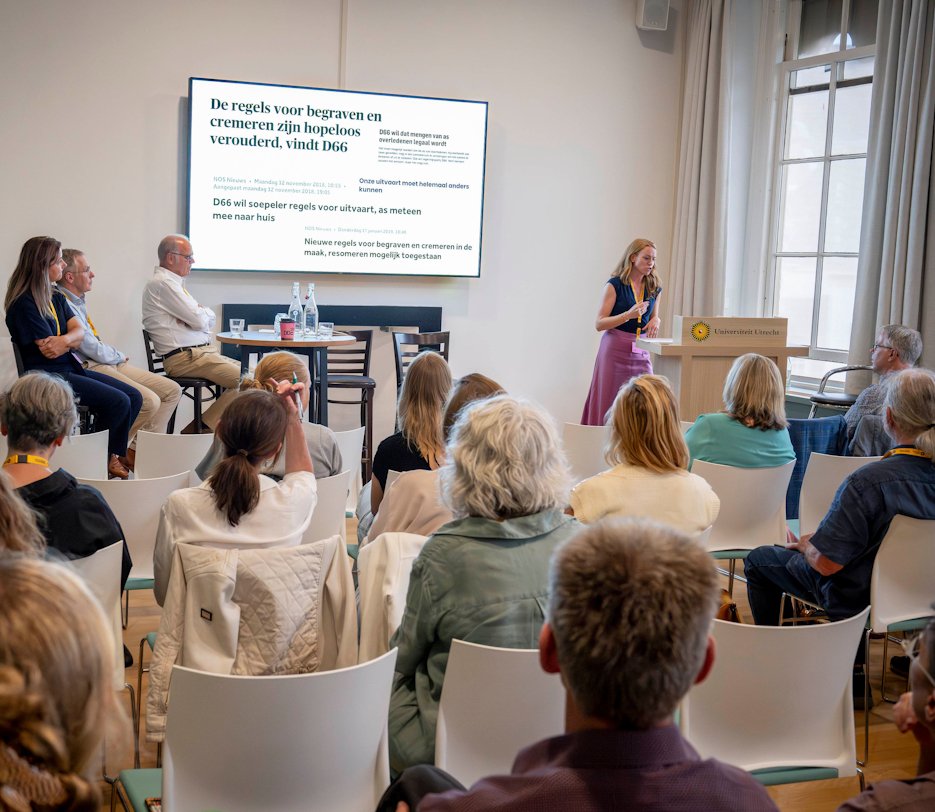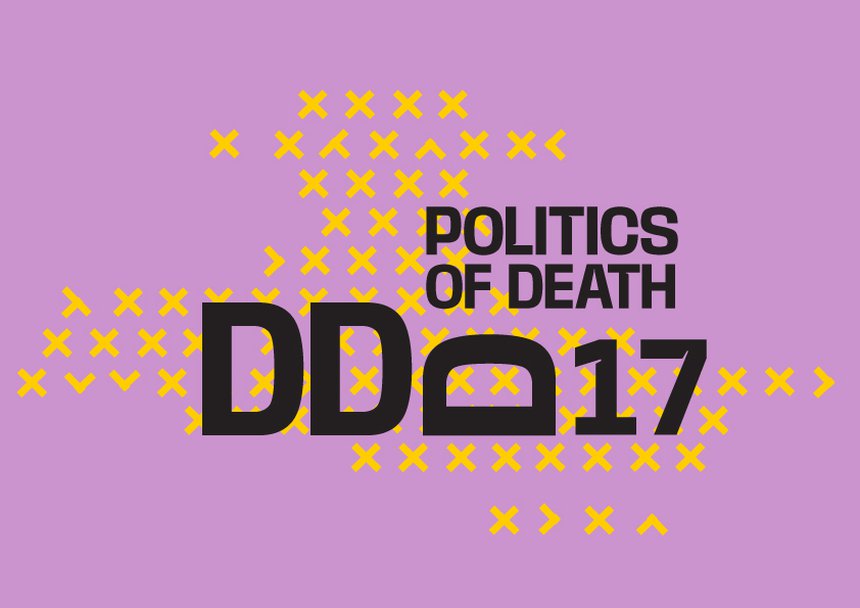 Een vol leslokaal in het historische Utrechtse Academiegebouw, 28 augustus 2025. Foto: Hein Athmer.
Een vol leslokaal in het historische Utrechtse Academiegebouw, 28 augustus 2025. Foto: Hein Athmer.
Tot Zover
Roundtable Funerary Academy DDD17
The Funerary Academy organized a roundtable discussion during the DDD conference in Utrecht, August 2025, to address the new Dutch ‘Law on Disposal of Bodies of Deceased Persons’. This is a summary.
The new Dutch ‘Law on Disposal of Bodies of Deceased Persons’, which is currently being drafted, is set to replace the existing 1991 Wet op de Lijkbezorging (Corpse Disposal Act). One notable change in the new legislation is the allowance of resomation (water cremation or alkaline hydrolysis). However, the process of drafting the new law has brought several other complex issues to light.
The roundtable, moderated by Brenda Mathijssen, Associate Professor of Geography and Psychology of Religion, gathered experts from the funerary industry and death studies scholars to discuss three key statements.
Statement 1
Language and Emotionality in Legislation
Frank Vandendries, philosopher and funeral director, presented the first statement: “Stick to the facts and keep the language clean and sober”. Vandendries pointed out that the current law uses the word “corpse” (lijk in Dutch), while the new draft law refers to the “body of the deceased”. He argued that this change is not an improvement, advocating for the preservation of “body” for the living and “corpse” for the dead. For him, the change risks incorporating the emotions of funeral services into the legislation. He questioned whether it’s appropriate to include subjectivity and personal sensitivity in legislation, asking if this doesn’t risk ambiguity, and suggested that “corpse” is more precise, unambiguous, brief, and compact.
Despite his argument, Vandendries’ statement prompted a lively discussion, with the general feeling being that “corpse” is quite outdated. Participants noted that “corpse” creates distance, which might be helpful for professionals in a morgue but is too much for others, as it overly reduces the deceased to an object.
Statement 2
The Need for Targeted Governmental Regulation
The second statement came from Brigitte Wieman, Director of the BGNU (the Dutch organization for funeral homes), focusing on areas that require governmental support and regulation. While the government appears to aim for minimal regulation, Wieman argued that taking responsibility for regulation first requires understanding which processes and people truly need regulatory support. She strongly believes that regulation is essential where consumers cannot reasonably be expected to make informed decisions on their own. In this context, she specifically advocated for targeted regulation of invasive postmortem care and clear accountability for funeral professionals. According to Wieman, this is about ‘good care’ and protecting society through clear, practical, and supportive rules.
The general consensus among participants was a welcome for the idea of setting basic rules. The discussion touched on how far to go, suggesting a minimum requirement that if a funeral director commits a clearly illegal act that causes a public outcry, they should be liable for suspension. This, in turn, requires the mandatory registration of professionals, a system that already exists in England and Scotland.
Statement 3
Protecting the Next-of-Kin
Edzo Doeve, former CEO of the Dutch funerary service provider DELA and member of the Funerary Academy, built upon Wieman’s statement by focusing on a missed opportunity in the new law: not considering the perspective of the relatives. Doeve emphasized that funeral services are not just about how you deal with the deceased, but primarily about assisting the next-of-kin. Research shows that relatives expect the deceased to be treated with respect and decorum and that the professionals are well-trained and guided by professional norms. Currently, the lack of an explicit normative framework makes it very difficult for relatives to file a complaint. Doeve raised the question of how to protect relatives from abuse or mismatches in information.
Simple amendments to the new law have been proposed: make it possible for relatives to file a complaint with an Ombudsman appointed by the government; make it mandatory to adhere to the Ombudsman’s rulings; and ensure that a professional register requires adherence to certified education and training programs.
The idea of protecting relatives was broadly welcomed. However, there was a discussion about whether this protection would be better implemented in a separate law. The role of an Ombudsman was also debated, with participants agreeing that the position must be independent and publicly supervised to be viewed as legitimate. The need for a common set of basic rules and values in funeral services, coupled with certified education, was welcomed as a way to make the industry more professional and trustworthy.
Contact
Voor inhoudelijke vragen: Martin Hoondert, voorzitter Funeraire Academie, M.J.M.Hoondert@tilburguniversity.edu

Politiek van de dood
De dood is politiek en voert het politieke uit. Dit is niet alleen duidelijk in de dood zelf, maar ook in de doden (die politieke actoren kunnen worden), hun lichamen, het stervensproces (dat onder andere infrastructureel gerelateerd is aan politiek discours en ongelijkheid) en rouw (dat ook een politieke daad kan worden). De politieke aspecten van dit thema reiken verder dan nationale of internationale politieke instellingen (zoals regeringen, staatsactoren, multinationale ondernemingen of politieke of religieuze allianties) en omvatten alles en iedereen die te maken heeft met (de uitoefening van) macht en moraliteit, zoals families, verwanten, buurten en vriendschapsnetwerken.